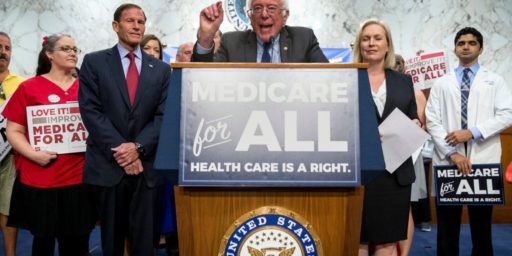Health Care, Choice, and the Role of Government
Over at Cato-at-Liberty Michael Cannon has an interesting post. Cannon argues that the Republicans are moving more and more towards a Big Brother view of government.
The Cato Institute has noted for some time that conservatives and Republicans have abandoned their limited-government principles when it comes to health policy. Examples can be found here, here, here, here, and here.
The New America Foundation just made our job a little easier, by producing a paper titled, “Growing Support for Shared Responsibility in Health Care.” In this context, “shared responsibility” means allowing the government to force all Americans to purchase health insurance — a power the Left has craved but no government had dared assume until Massachusetts did so this year.
[snip]
Unfortunately, there has been too little debate within the limited-government camp over this idea. This is in part because Heritage Foundation scholars have repeatedly declined to debate Cato scholars or other free-market critics of their proposal.
Until we’re able to have that fuller debate, here’s a helpful algorithm for judging this and other health care proposals:
- Does it limit government power?
- If not, move on to the next proposal.
I am sympathetic to Cannon’s view here. The direction most people seem to be either in favor of, or coming around to is that the government should take over health care. Further, that this move towards bigger and bigger government is one of the big problems with Republicans these days.
However, I think that Cannon is ultimately wrong here. Not wrong in principle, but wrong from the stand point of can his view win.
The problem is that currently we have laws that forbid hospitals from treating patients on the basis of ability to pay. That is a hospital cannot refuse service/treatment based on ability to pay. This creates some serious incentive problems for any market based approach.
Consider the following:
- Bob is young (25 years old).
- He is single.
- He is healthy.
- He doesn’t have much in the way of seizable assets (i.e. no house, a mid-priced car that is now used, etc.)
For somebody like Bob, buying insurance is a sucker’s game. Why buy it? He wont likely get out of insurance what he pays in. Further, even if he does do a number on his noggin while snow-boarding he will still get treatment. And so what if he can’t pay; what are they going to do, take is crappy car? No, for Bob, there is no incentive to go out and purchase insurance.
Consider this case:
- The Johnsons are struggling.
- They have 2 kids.
- They are healthy.
- They don’t own much in the way of seizable assets.
For the Johnson’s also buying insurance might look very much like a suckers game. If they need treatment and go to the emergency room they will eventually get it. If they can’t pay, there isn’t much that can be done to them. The Johnson’s might rationally decide to forgoe health insurance in favor of things like paying rent, buying food, and so forth.
In both cases the law that requires hospitals to treat patients irrespective of ability to pay creates a very serious incentive that will lead to a quite possibly very expensive market failure.1 As such, a market based approach will almost surely fail in that only those who have assets and/or have reason to think they will need insurance will purchase it. This means that premiums will be higher to cover the costs of those who do not purchase health insurance since those expenses will have to be covered somehow.
One could argue that the law requiring treatment irrespective of ability to pay be revoked. I contend that this view is such a dead horse politically there isn’t even a horse to beat anymore. Think of it, a politician gets up there and flashes a picture of some cute chubby faced child who has some horrible medical need through no fault of the child’s. But those hospitals have wheeled this child to the curb to suffer and eventually die unless something is done. Sure, I imagine that in many cases charity will come through, but in all of them? And as a parent would you want to take the risk of having to rely on charity? Nope, this just isn’t going to happen.
I see the solution of requiring, by law, that all people have catastrophic health insurance along with a government voucher program for health insurance to be the only real solution. This solution has the benefit of still giving consumers choice over which company insures them and promotes competition.2 At the same time everybody has insurance thus taking the wind out of the sails for those who think the government should provide payment for all health care.
Basically, this is a rear-guard fight at this point. The idea that we can go to a purely market based system is, in my view, a totally unrealistic idea. To continue to push for it will only provide the opening for those who want government provided health care to get what they want. I don’t know if the idea of vouchers along with mandantory catastrophic health care meets the Cannon test for health care policies.
______
1Please note that I am not saying that all people without insurance are like this. I am merely trying to highlight the perverse incentive that a well intentioned piece of legislation has created.
2For example, if people can find insurance that is less than the value of their voucher they might be able to keep a portion of the money.






When you’re talking about market incentives, I don’t think that either the young 25 year old or the struggling parents of two want to have hospital collections on their credit report, which might virtually ruin their ability to buy a home, get a car loan, etc….
Sure it is a pain Alex, and I agree that down the road it can be a problem…but only for a few years. In hindsight I bet some of the single people and poor families wished they had health insurance. Still, a priori that isn’t what people consider.
You are still going to run into the problem of people suffering some sort of medical condition that won’t be covered by their plan and be unable to pay for treatment.
Let’s say you have unanticipated medical expenses that equal x, but your self-selected plan covers y? If x>y and you can’t cover the difference what happens?
Right now you are seeing people who are not eligible for medicaid in precisely this scenario where they have to sell their homes and remain in perennial debt to pay for health care costs associated with catastrophic illness.
If you add the dirt poor into the mix–as your suggestion would do–the number of people in this situation increases. Health care providers, in turn, boost their costs which then boost insurance rates across the board. Then you have people complaining that the vouchers are insufficient to meet costs and political pressure to increase the amount of the vouchers.
Then we get into more deficit spending.
How is this different than a new tax to pay for universal health care? I can shop around, sure, and the money goes to a business not the government, OK, but it’s still a law requiring me to give money for insurance whether I want it or not.
You would also have to regulate the conditions of the plans a business offers, to comply with the proposed law, less some dishonest company offer a plan that only covers treatment in hospitals in Uganda on alternate Thursdays at $10/month ,for those who don’t want to pay for real insurance but need to comply with the law. Government regulating the terms of the insurance they’re forcing you to buy, how is that not universal health care?
I’m not sure what you even mean by “government vouchers”, some kind of fund to pay for less than catastrophic health care? Payed for with what, new taxes? Again, how is this different from universal health care?
So let me see if I understand your argument. The free market approach faces serious political obstacles. The current approach has a hidden tax wherein the cost to treat those who can’t pay (because they can’t afford insurance or don’t want to afford insurance) is spread among those who can pay (via insurance or winning the lottery).
I’m not convinced to give up on other alternatives than just open the wallet to a bigger government. Some examples,
1) A 90%+ rate tax on trial lawyers profits in medical malpractice cases.
The taxes are put in a fund the hospitals can draw on to compensate for indigent care expenses (though this does incentivize them to provide more indigent care). It also disincentivizes medical malpractice cases, which reduces upward pressure on medical costs. Win win, we reduce the pressure on rising medical costs and help fund the indigent care. Of course laffers curve will tell you the 90% rate is likely to severely reduce the activity and generate little revenue. So depending on which side of the win-win you prefer, your preferred tax rate may vary. An incremental 10% increase in taxes (which would have a much less disincentive) would generate more revenue than the 90% tax rate. That is unless you are a liberal and don’t believe the laffer’s curve. Then the 90% would generate more revenue and have no disincentive to trial lawyers.
2) Outlaw employer based insurance and open up the insurance regulations to allow more efficient insurance pooling.
Employers will still need to compensate employees for health care, it just will become something that the employee will see the money go through their hands. Health coverage can follow more easily from job to job because the insurance is tied to the person, not the company. To make it work, we would have to stop the practice of pooling insurance based on the employer and let the insurance companies group people according to risk. As it stands now, the unmarried single guy and the married with kids are generally pretty close to each other in their own out of pocket costs because they are pooled together by the employer pool. But the realistic health expenses for the two are very different.
3) Allow health providers to efficiently garner wages or government benefits for unpaid health costs.
We don’t have tiny Tim (dickens, not the fruit with the ukulele) being pushed out to die on the sidewalk. We instead see little Timmy’s parents losing part of their welfare check, tax refund or wages. A much more nuanced political discussion. And the 24 year old doesn’t just risk his ‘crappy car’, but a significant piece of his future earnings. See the delinquent child support payment garnishing as an example. This won’t cut down on truly indigent care cases (e.g. homeless who have no job), but would cut down on those choosing to transfer the risk to society as a whole and collect from those who need care when they made such a transfer).
4) Go the Colorado approach and require proof of citizenship before getting any government service.
Their best guess is this is only 5% of those getting the benefits, but hey, cutting down by 5% is a nice savings.
5) Amend the constitution to allow for debtors prison in cases of unpaid health expenses.
Of course to make economic sense, this is going to have to be a work farm environment where the accommodations are less posh and the prison makes money of the prisoners.
this is not too encouraging
Hezbollah Launches Deep Rocket Strike on Israel
Problems with doing away with employer subsidised health insurance:
As the American Diabetes Association can tell you in their annual summary of health insurance, individual policies for diabetics are most often not worth the paper that they are printed on. Pooled risk will have to be explained more before I will think that it is a viable option. If all diabetics are pooled together, all that does is create an expensive pool with expensive premiums, and many diabetics would not be able to afford them.
Anything “diabetes related”–and they seem to be able to make anything and everything “diabetes related”–gets excluded with the pre-existing condition magic wand. Group policies get around this somewhat by averaging in the diabetics with the overall population and spreading the risk.
This claim is dubious because you already pay for other peoples health care via government mandate. Granted it is indirect, but you still pay.
Pooling is just another form of subsidies. In this case, the healthy pay for the un-healthy.
Great, so now people just don’t go the doctor until it is really really expensive and in some instances too late. Another political loser if I saw one.
Two more political stinkers.
You mean like Communist China and Pol Pot’s Khmer Rouge? Pardon if I don’t think these will fly either.
Yep, pre-existing conditions are a problem and wont work with insurance. So either we pony up and pay for these people, as a society, or we toss them to the market place and say, “Screw ’em” sort of like Kos.
I think one of the worst things that ever happened to healthcare was that it got attached to employment. I would much rather see health insurance in the same sphere as auto insurance, where you buy varying types of coverage, with varying deductibles-you figure out how much risk you want to assume.
To be honest if I was single medical insurance would mostly be a boon for the company. They would get about $500-700 a monht in premiums, but I have been to the doctor exactly twice in the past two years-both times were yearly physicals. I think between the doctors and the labs I may have spent about $1000 total for the two visits. So going with the lower end premium of $500 a month, that means I paid $12000 and spent $1000, and the insurance company pocketed $11000. I would be much better off at this point purchasing a catastrophic plan and going with either a health savings account or pay as I go for the basic things not covered.
I have a hard time finding a problem with the idea that the wealthiest country in the history of the world should find a way to get everyone minimal health care.
Aside from the humanitarian aspect, (I am sure all those “compassionate conservatives” agree here). it would almost certainly be cost effective simply because a little preventive care will cut downstream costs and ERs will not be used a clinics by the uninsured.
I agree it would be cost effective for the latter, but not the former. HMOs were created with just that purpose in mind and it failed miserably. ERs on the other hand are not for treating the common flu, hang nails, and pink eye.